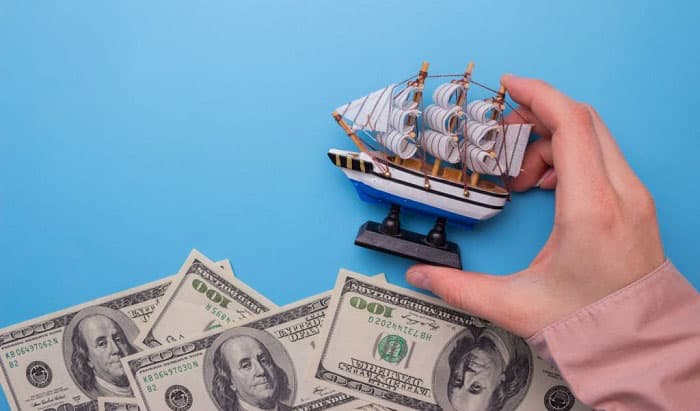Boating is a costly activity, and getting a boat that is well made and reliable means shelling out even more. Due to how expensive boats can be, it is a good idea to weigh our options carefully and consider a wider range of methods for financing a boat. But how does boat financing work?
In this article, we’ll discuss options for purchasing a boat, including a few channels which would be well worth our time to explore.
Keep reading to learn more.
Table of Contents
Boat Financing Basics
Boat loans work similarly to financing other types of vehicles such as cars. The big difference is that boats are considered luxury items, which makes them more costly.
The amount necessary to purchase the vehicle will be your base loan. Any down payment made will be deducted from that base loan amount. Additional fees and interests will then be added to the base loan, which will then be divided depending on the agreed-upon terms of your loan.
Depending on how good your credit history is and a few other factors, you may receive better rates. Specifically, terms may vary depending on your credit strength, the type of loan, and the channel you’ve chosen. This is why it is a good idea to explore your options, make careful planning and consideration before finalizing a deal.
Getting Started
Applying is similar to how you would apply for other types of loans; find a lender, file the necessary paperwork, and provide the requirements. There will still be a review as usual, and there are various items that will be considered before your application is approved.
Getting your loan approved is one thing, but it is also important to find a deal that you approve. Terms for financing a boat will differ depending on many factors, and it is important to find the right combination that works for your situation.
Below are some important aspects of boat financing that we should take a look at before closing in on a deal. By familiarizing ourselves with them, we will be able to make an informed decision.
Types of Loans
There are three general loan types to look at. While different lenders may offer many different types, they will fall into one of these.
1. Secured
Secured loans are those that involve an item as collateral. Missing payments means that the lender may take possession of the specified collateral.
For secured boat loans, the boat for which a loan is placed typically serves as collateral. However, there are some states where it is not legal to repossess certain types of collateral, so it may be a good idea to research such things to know which option would be available in your home state.
These types of loans are the type popularly attributed to banks, though they are offered by different lenders with terms usually ranging between 10 to 20 years.
2. Unsecured
Unsecured loans are those that do not make use of any collateral. While this means that such loans are safer for the borrower, this also means this type of loan is riskier for lenders, which makes this an unattractive loan type for them.
Expect unsecured loans to be more difficult to have approved with higher interest rates and much shorter payment terms at 5 years or less. A higher credit score and excellent credit history will do a lot for you if you choose to go with this option.
3. Second mortgage
This type of loan involves taking out a second mortgage on a property that already has a mortgage on it and typically involves a house. It is a popular option if you are looking for a high-value loan, which is exactly what you’ll need for a boat.
This works similar to a secured loan but involves a higher level of risk as you may lose your house when missing payments.
The second mortgage has two types: the home equity loan and the home equity credit line. The home equity upon which the value of this loan type depends is determined by taking the current market value of a property and deducting any liens, such as any existing mortgage or debt.
- Home equity loan
Such loans involve a lump-sum payment where a portion of the equity value will be provided to you. Loan payment involves monthly installments with interest. Terms usually range from 5 to 30 years.
For financing a boat purchase, a home equity loan makes more sense due to the value of money involved.
- Home equity line of credit
Instead of money, you will receive a line of credit based on the value of your home equity. Much like a credit card, you will be given a certain amount of credit which is payable and reusable.
However, this line of credit is available only for a limited period. The remaining balance after the draw period is paid depends on the terms set by the lender.
Financing Channels
There are many entities that you can approach for boat loans, such as banks and credit unions, and different lenders may offer different options. Below are some of the more popular lenders available.
1. Banks
These days, most banks offer boat loans that are competitive and sensible. However, better rates are usually available only for bigger loans. Most banks offer different loan types, but expect to have more stringent screenings for such applications compared to other creditors.
2. Boat Dealers
Some boat dealers and even manufacturers offer certain financing options, though which options are offered will vary greatly among different companies and entities.
3. Credit Union
Boat financing and boat loans are offered by many unions, though membership is an expected requirement. Even entities such as the USAA and other military unions offer such deals. This is a good option to explore if it is available to you.
4. Marine Finance Companies
Companies specializing in marine financing are an excellent choice for purchasing a boat. Since boats are included in their field of expertise, expect them to have a wider range of options available that other lenders may not have. If you’re looking for something tailor-fit, this may be the best option to explore first.
Considerations for Choosing a Financing Option
There are many things we need to consider when planning for expenses related to our boat. Plan your expenses starting with the following considerations.
1. Total boat costs
The boat purchase aside, numerous other costs make up the total expense we should expect to incur. Furnishings, boat equipment, modifications and add-ons, monthly fees, and boat maintenance costs are just some of the things we need to account for.
It’s a good idea to try to grasp just how much we are willing to spend and how much we’ll need before proceeding with a loan.
2. Interest Rate
Interest rates vary depending on the loan type, and a lender with unsecured loans has higher rates for any loan. Expect an average boat loan interest rate of 4 to 5% while unsecured loans start higher at around 7 to 8%.
If you are working with a credit or loan expert, there may be ways for you to minimize if not eliminate the impact that any interest rate may have on your loan.
3. Down Payment
This amount will vary, but expect to pay at least 15% of the total. While you may be able to secure deals with lower than 10% as a down payment, these will usually include much higher rates.
4. Credit Score
Your credit score and credit history will play a big part not just in getting your loan or financing application approved, but will also affect how good a deal you can get. Excellent credit scores can net you much better deals. On the flip side, boat financing for poor credit may result in much higher rates and shorter terms.
5. Terms
The loan term refers to how many monthly payments are needed to pay off the entire loan. While a shorter term means clearing the debt sooner, this will also mean a larger amount to pay every month. Consider the balance between term length and monthly payment.
Frequently Asked Questions
Why consider boat financing?
Making use of a loan or financing doesn’t mean you don’t have enough money, it’s all about financial flexibility and ensuring that you don’t dig yourself into too deep a hole.
Setting up a boat involves more than just shelling out money to buy the boat. You also need to spend for everything else you’ll need on the boat. Making use of financing will allow you to plan your boat expenses properly.
Do I need a marine survey for the boat?
Consider this a necessity if the boat you plan to purchase is pre-owned.
How long does it take for my application to be approved?
Approval time varies depending on many factors, such as the type and value of the loan, but the primary factor is the lender from whom you’re getting the loan. This can range from a day to weeks.
Can I use a credit card for my boat purchase?
Yes, but a credit card cannot provide the flexibility that financing options offer. Don’t use it unless you plan to pay off the entire amount right away.
Conclusion
Figuring out how boat financing works can be complicated, but equipping yourself with the knowledge necessary to plan for your boat purchase is well worth it. Knowing how much you spend and ensuring you don’t go overboard will go a long way for your boating lifestyle.
Do you know anyone else asking how does boat financing work? Consider throwing this guide their way so they too can weigh their options properly. Also, please leave your comments and suggestions below.
Remember to boat safely.

“My intention from the first day establishing Boating Basics Online is to provide as much help as possible for boaters who want to experience a first safe and convenient trip. So feel free to join us and share your beautiful journeys to the sea!”



